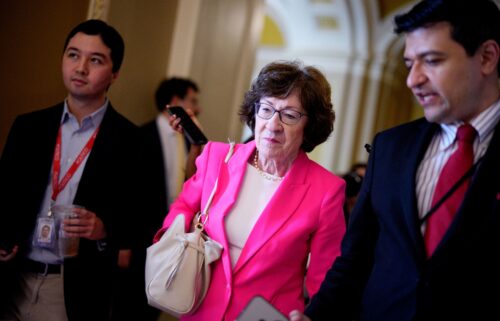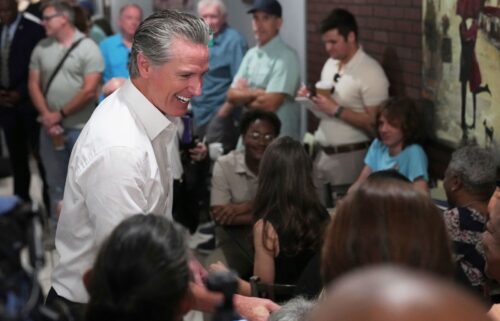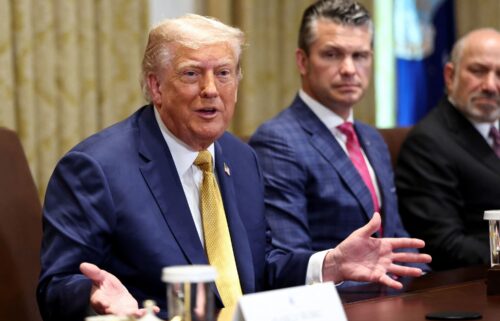Inside Biden’s fiery speech and his decision to confront Trump’s danger head on
By Jeff Zeleny, Kaitlan Collins and Kevin Liptak, CNN
It was only a little more than a month ago when President Joe Biden, asked about another head-shaking revelation regarding his predecessor, seemed to balk at a mere mention of the man.
“I don’t think about the former President,” he claimed, pausing for dramatic effect before walking offstage at the White House.
But on Thursday, it was evident Biden has actually been thinking quite a lot about Donald Trump.
Without naming him, Biden referenced the “former President” 16 times in a cutting address marking the anniversary of the January 6 riot at the US Capitol. Standing in the very space where would-be insurrectionists had marched to interrupt the peaceful transfer of power, Biden denounced his predecessor in a way he’s never done before — indeed, in a way few US presidents have ever deemed necessary when discussing their forerunners.
As he prepares to enter the second year of his presidency, advisers say Biden is still adamant about not allowing his predecessor to overshadow his administration. But on the one-year anniversary of a historic day, Biden not only signed off on the fiery tone he brought to his speech marking the occasion at the Capitol, he also helped write some of the lines himself.
“A former president of the United States of America has created and spread a web of lies about the 2020 election,” Biden said, leaning into his words and raising his voice in indignation.
“He’s done so because he values power over principle, because he sees his own interest as more important than his country’s interest and America’s interest and because his bruised ego matters more to him than our democracy or our Constitution,” Biden said, adopting a tenor he’s rarely used — on any topic — in the 12 months since being sworn in.
In meetings where Biden discussed the speech with his team over the past month and a half, advisers came away with the clear impression it was a deeply personal moment for a president whose tenure has been shadowed by the lies about voter fraud that Trump has peddled about the 2020 presidential election and the enduring grip he continues to hold on the Republican Party.
Biden came to the sessions — which began in late November — with distinct views on the tone he hoped to adopt during the address, according to officials familiar with the speech’s drafting. Biden, according to one, felt he “absolutely had to speak on this day” and make clear that what had transpired last January 6 “wasn’t normal.”
The speech harkened back to themes from Biden’s campaign, when he repeatedly pledged to “restore the soul of the nation.” It was, he said again and again, the central reason for jumping back into the political arena on a mission to defeat Trump.
The President’s pointed approach toward Trump on Thursday marked a sharp departure from his posture over most of the last year as he has intentionally sought to keep his predecessor from hijacking the first year of his administration.
He has sometimes been criticized for failing to explain with enough passion the corrosion of the nation’s democracy he feels is underway, even though it’s a topic that aides say drives Biden and animates much of his presidency. The speech was calibrated to meet the historic moment, advisers said, with election lies still rampantly coursing through a Republican Party that remains in thrall to Trump.
The President has been deeply concerned by recent polling, which has found that a strong majority of Republicans and a sizable share of independents have bought into Trump’s mistruths about the election. In some surveys, as many as 7 in 10 Republicans say that fraud helped Biden win — a claim that’s been repeatedly debunked.
Mike Donilon, a longtime counselor to Biden who has crafted most of his marquee speeches, played a key role in writing Thursday’s address alongside the President’s chief speechwriter, Vinay Reddy, who also served Biden when he was vice president.
They received an assist from longtime presidential historian Jon Meacham, who worked behind the scenes with Biden and his team to put the speech in historical perspective in line with other traumatic national events, according to three officials familiar with the matter.
Whether to name Trump in the speech was of little discussion it was being drafted, according to officials. Instead, aides focused on how sustained — and scathing — the attack on Trump should be.
“Going after the former President is inherently political,” one official noted.
Ultimately, Biden did not use Trump’s name, though it was of little consequence. His references to the man who had once held his office were plain and deeply cutting.
He assailed Trump as the “defeated former President,” one who had “failed to make his case to voters” and “lost” an election by millions of votes. The language appeared designed to agitate Trump, who has a special aversion to losing and to weakness, though advisers said that was not their specific intent.
Biden himself told reporters after the address that he had avoided naming Trump because he did “not want to turn it into a contemporary political battle.” Still, from his estate in Palm Beach, Trump fired back in a statement accusing Biden of “lies and polarizations.”
“It looks like he saw the speech,” Biden’s press secretary, Jen Psaki, said later in the day. “I guess that’s good news. Maybe he learned something about what it looks like to meet the moment in the country.”
The speech in Statuary Hall, a familiar place in Biden’s beloved Capitol, came at a time when the President needed something of a political lifeline entering the second year of his term weakened by the persistent Covid-19 pandemic and its enduring social fallout. White House aides are hopeful the speech will help unify Democrats after a bruising year of divisions inside the ranks of the party.
Biden rehearsed the address only once, during a run-through on Wednesday. Aides had cleared his schedule in preparation for Thursday’s speech, though he also had closed-door meetings on other topics.
After delivering his remarks, Biden felt good as he climbed back into the presidential limousine. But his first questions, aides said, included: What did everyone else think? And how, he asked aides, did they think people digested it?
Even before he returned to the White House, aides in the West Wing felt a sense of relief once Biden had finished speaking, given the preparation leading up to the address and the urge to ensure he delivered a speech that met the moment.
As the day wore on, the West Wing viewed the speech as a rousing success, aides said, and believes it is poised to serve as a prelude to an address Tuesday in Atlanta, when he will offer a full-throated push for voting rights legislation and election reform. Supporters are hopeful the President will issue a call to change the Senate filibuster and the White House has signaled that he’s prepared to do so.
Still, officials say the emphasis in Atlanta won’t be on Trump. Biden’s advisers plan to be selective about attacking the former President directly going forward because they don’t see it as something the American people need or want right now, according to one senior administration official.
“You’ve got to face it,” Biden said. “That’s what great nations do: They face the truth, deal with it and move on.”
The-CNN-Wire
™ & © 2022 Cable News Network, Inc., a WarnerMedia Company. All rights reserved.



